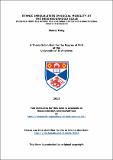Files in this item
Ethnic inequalities in social mobility at the neighbourhood scale : evidence from the Office for National Statistics Longitudinal Study in England
Item metadata
| dc.contributor.advisor | Flowerdew, Robin | |
| dc.contributor.advisor | Feng, Zhiqiang | |
| dc.contributor.author | Feng, Xiaoqi | |
| dc.coverage.spatial | 546 | en_US |
| dc.date.accessioned | 2013-06-11T11:39:59Z | |
| dc.date.available | 2013-06-11T11:39:59Z | |
| dc.date.issued | 2012 | |
| dc.identifier | uk.bl.ethos.574779 | en_US |
| dc.identifier.uri | https://hdl.handle.net/10023/3666 | |
| dc.description.abstract | Compared to their White peers, ethnic minorities in England are often at higher risk of becoming unemployed, unable to find employment, and more likely to experience downward, rather than upward social mobility. Qualifications, gender, age, marital status and migrant generation all play a role; but do not explain these ethnic inequalities, or ethnic penalties. Despite ethnic minorities being more likely to live in deprived neighbourhoods than Whites, research on ethnic inequalities in social mobility has rarely taken account of the role of context. Neighbourhood deprivation may reduce life-chances for various reasons, and the concentration of ethnic minorities into deprived neighbourhoods may have additional influences for social mobility: some positive, but also some negative. In this thesis, I ask: does neighbourhood deprivation and ethnic composition explain the ethnic inequalities in social mobility? Using a longitudinal analysis of the Office for National Statistics Longitudinal Study, I tracked the intragenerational social mobility of people living in urban areas of England between 1991 and 2001. Binary and multinomial logit regression models were fit with ethnicity as an independent variable to explore statistical differences between groups, and also for the White, Indian and Black Caribbean groups separately. My research shows that after controlling for education, couple status, and a number of other important characteristics, geography does play a role in life-chances; but does not fully explain the ethnic inequalities in social mobility. People in more deprived neighbourhoods tended to fare worse in all economic outcomes: more at risk of unemployment; less likely to find employment; more at risk of downward social class mobility; less likely to experience upward social class mobility. However, these results were statistically significant only among White people, with less consistent associations for ethnic minorities. Ethnic diversity had a positive influence upon outcomes (e.g. upward social class mobility), but only among White people. Positive outcomes were also more common among people living in the south of England. Place of birth was less important for social mobility. For policymakers attempting to reduce the geographical inequalities of deprivation and affluence, dissolving residential concentrations of minorities alone is unlikely to reduce the gap in life chances between Whites and ethnic minorities. No evidence was found to support the pejorative stereotyping of so-called ‘ethnically segregated’ neighbourhoods, which are some of the most diverse in England and, on balance, appear to improve the life chances of White people. | en_US |
| dc.language.iso | en | en_US |
| dc.publisher | University of St Andrews | |
| dc.subject.lcc | HN400.S65F4 | |
| dc.subject.lcsh | Minorities--Great Britain--Social conditions--20th century | en_US |
| dc.subject.lcsh | Minorities--Great Britain--Social conditions--20th century--Longitudinal studies | en_US |
| dc.subject.lcsh | Equality--Great Britain | en_US |
| dc.subject.lcsh | Equality--Great Britain--Statistics | en_US |
| dc.subject.lcsh | Social mobility--Great Britain | en_US |
| dc.subject.lcsh | Social mobility--Great Britain--Statistics | en_US |
| dc.subject.lcsh | Neighborhoods--Great Britain--Statistics | en_US |
| dc.subject.lcsh | Neighborhoods--Great Britain | en_US |
| dc.subject.lcsh | Great Britain--Social conditions--20th century | en_US |
| dc.subject.lcsh | Great Britain--Social conditions--20th century--Statistics | en_US |
| dc.title | Ethnic inequalities in social mobility at the neighbourhood scale : evidence from the Office for National Statistics Longitudinal Study in England | en_US |
| dc.type | Thesis | en_US |
| dc.type.qualificationlevel | Doctoral | en_US |
| dc.type.qualificationname | PhD Doctor of Philosophy | en_US |
| dc.publisher.institution | The University of St Andrews | en_US |
This item appears in the following Collection(s)
Items in the St Andrews Research Repository are protected by copyright, with all rights reserved, unless otherwise indicated.

